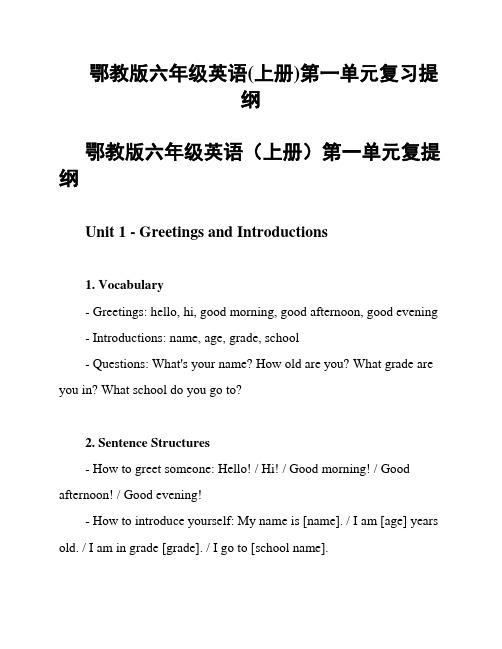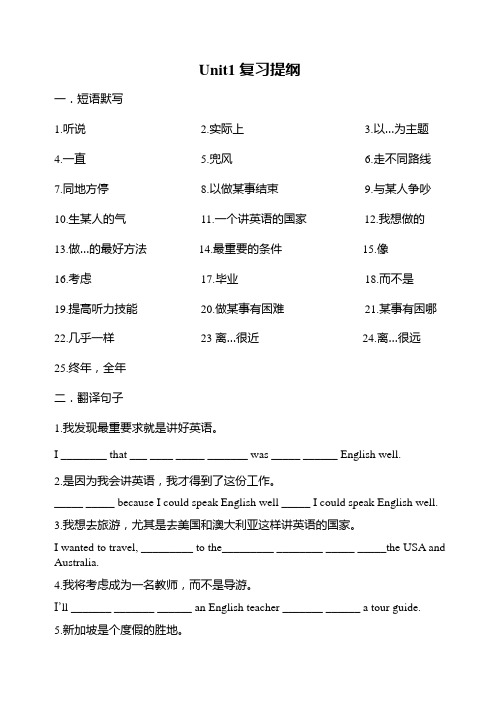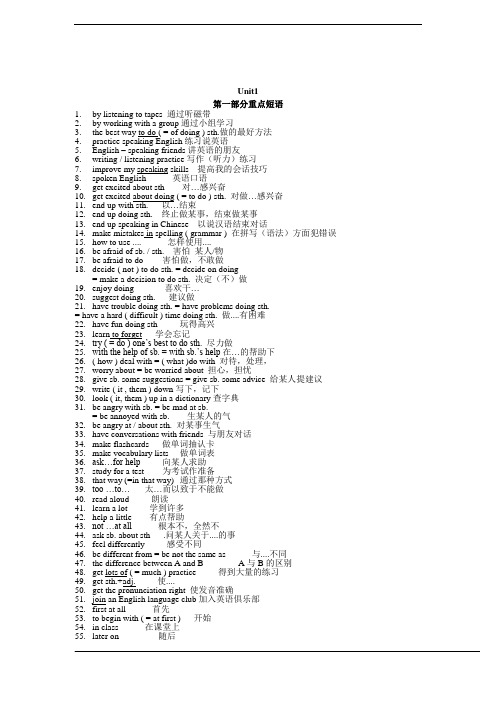英语第一单元复习提纲
鄂教版六年级英语(上册)第一单元复习提纲

鄂教版六年级英语(上册)第一单元复习提纲鄂教版六年级英语(上册)第一单元复提纲Unit 1 - Greetings and Introductions1. Vocabulary- Greetings: hello, hi, good morning, good afternoon, good evening - Introductions: name, age, grade, school- Questions: What's your name? How old are you? What grade are you in? What school do you go to?2. Sentence Structures- How to greet someone: Hello! / Hi! / Good morning! / Good afternoon! / Good evening!- How to introduce yourself: My name is [name]. / I am [age] years old. / I am in grade [grade]. / I go to [school name].- How to ask questions: What's your name? / How old are you? / What grade are you in? / What school do you go to?3. Dialogue Practice- Practice having simple dialogues with classmates or friends using the vocabulary and sentence structures above.- Start by greeting each other and then introduce yourselves using the appropriate sentences.- Ask and answer questions to get to know each other better.4. Listening Exercises- Listen to audio recordings or videos with greetings and introductions.- Practice recognizing the vocabulary and sentence structures used.- Repeat the greetings and introductions after listening.5. Writing Practice- Write a short paragraph introducing yourself.- Include your name, age, grade, and school.- Use proper sentence structures and vocabulary learned in this unit.6. Speaking Activities- Practice speaking in front of the class or with a partner.- Use the greetings and introductions you have learned to confidently introduce yourself.- Take turns asking and answering questions.7. Review Games- Play interactive review games to reinforce vocabulary and sentence structures.- Use online resources or create your own flashcards and quizzes.- Have fun while reviewing!Remember to review regularly and practice using greetings and introductions in real-life situations. Good luck with your English studies!Note: This document is a general review outline for the first unit of Grade 6 English (Book 1) in Hubei Education Edition. The specific content may vary based on the textbook and curriculum used in your school.。
人教版新目标九年级英语上册unit 1 复习提纲

人教版新目标九年级英语上册unit 1 复习提纲人教版新目标九年级英语上册unit 1 复习提纲unit 1 How can we become good learners?by介词的用法:1.表示做某事的方法,by + 名词/代词/ doing , 对其划线提问用howI study English by watching English movies. How do you study English?2.by +交通工具,对其划线提问,用howI gl by bike. How do you glby+时间,不迟于,在…之前Please replletter by Fridaby 在…旁边 The teaanding by the windowby在被动语态中,引出动作的执行者:The book is written by Lu Xun.work wds 和朋友一起学习 make word groups制作单词卡片 read the textbook读课本 ask sb for help 向某人求助 study for a test 为考试做准备 work with a group 参加小组学习 have conversations with sb 和某人交谈,沟通= talk with sb read aloud朗读practice doing sth练习做某事 what about doing sth干某事怎么样?speaking skills口语技能glish 英语口语doing sth完成干某事give a report作报告 gain ideas 理解主要意思read word by word逐字阅读do sth设法做某事 try doing sth尝试做某事’s best to do sth尽某人最大努力做某事 be patient耐心点 be patient with sb 对某人有耐心(patient作为名词病人)find / make / think + it +adj (for sb)to do sth 发现/ 使/ 认为做某事对于某人来说是…的it为形式宾语,真正的宾语是to do . 如:I find it difficullearn English well…的秘密,…的秘诀Tuard w大多数时候 be afraid of doing sth 害怕做某事 be afraid to do 不敢做某事 because of + 名词性短语 because + 句子 fall in love with sb/ sth爱上某人/某物begin to do sth开始做某事 body language 肢体语言the exaces他们脸上的表情 key words关键词gg有趣的事情 look it / them up 查阅It’s aake.小菜一碟 It serves you right. 你活该 so thader that以便,为了have a better understanding of对…有更好的理解as well也, 用于句末,不需要逗号隔开 I like English as well也,用于,需要逗号隔开 I like Engla记笔记do ex做练习atterns 背句型a diadiaries写日记increaading speed提高我的阅读速度make mistakes 犯错 make mistakes in在某方面犯错如:make mistakes in grammarhave a paaglish with (介词with不可省略,与前面的partner存在逻辑上的动宾关系,如: awrite with, a paper to wa house to live in)be born with天生具有 be born in 出生在某地如:I was born in Anhuability to learn学习的能力 the ability to do sth做某事的能力depend on 取决于,依赖,依靠 learning habits 学习习惯have…有共同之处create a在某方面建立兴趣如: create aglay a注意,关注;后接名词/代词/doing (注意:to 为介词)…with…把…和…连接起来We shouldwhat we need to learn wgg.get bored 变得厌烦,无聊 Ulose it 不用就作废Practice ma孰能生巧evven though即使,尽管 keep doing sth持续做某事write down key words 写下关键词 draw mind maps 画思维图 explab 向某人解释bit by bit一点点地=little by little instead of doing sth代替做某事名言警句:wledgqug.知识来源于质疑。
九年级英语上册复习提纲(Units1-10)

Unit 1 ReviewI. Phrases.1.通过做某事by doing sth.2.listen to 听3.向某人寻求帮助ask sb. for help4.practice (doing) sth. 练习…5.too…to…太…而不能…6.the (best)way to do sth. …(最好的)方法是…7.specific suggestions 具体的建议8.get /be excited about…对…感到兴奋9.end up doing sth. 结束做某事10.be frustrated at/with…对…失望11.do a survey about (doing) sth. 做一份…的调查12.keep an English notebook 记英语笔记13.spoken English 口语14.get…right 使…正确15.make mistakes in (doing) sth. 在(做)某事上犯错16.first of all 首先17.to begin with 开始ter on 以后,随后19.be afraid to do sth.不敢做某事;be afraid of doing sth.害怕做某事20.it doesn't matter 没关系ugh at 嘲笑…22.make a sentence/make sentences造句23.start to do sth.开始做某事24.one of the secrets of (doing) sth. …的秘诀之一25.take notes 记笔记26.decide (not)to do sth.决定(不)做某事27.enjoy doing sth.喜爱做某事28.not always不一定总,未必总29.have trouble/difficulty (in)doing sth.做某事有困难30.write down 记下,写下31.look up 查找32.make up 编造33.deal with 处理34.make sure 确信35.worry about 担心…36.be angry with 生气37.go by 过去,消逝38.regard as…将…视为…plain about 抱怨40.change into 将…变为…41.try one's best to do sth.尽力做某事42.with the help of…在…的帮助下pare to 把…与…做比较44.break off 中断45.in a positive way 以积极的方式46.what/how about doing sth.? …怎么样?II.Sentences.1.What about reading aloud to practice pronunciation? 大声朗读来练习发音怎么样?2.The best way to learn new words was by reading English magazines.学会新单词最好的方式是通过阅读英语杂志。
Unit1复习提纲

Unit1复习提纲一.短语默写1.听说2.实际上3.以…为主题4.一直5.兜风6.走不同路线7.同地方停8.以做某事结束9.与某人争吵10.生某人的气11.一个讲英语的国家12.我想做的13.做…的最好方法14.最重要的条件15.像16.考虑17.毕业18.而不是19.提高听力技能20.做某事有困难21.某事有困哪22.几乎一样23离…很近24.离…很远25.终年,全年二.翻译句子1.我发现最重要求就是讲好英语。
I ________ that ___ ____ _____ _______ was _____ ______ English well.2.是因为我会讲英语,我才得到了这份工作。
_____ _____ because I could speak English well _____ I could speak English well.3.我想去旅游,尤其是去美国和澳大利亚这样讲英语的国家。
I wanted to travel, _________ to the_________ ________ _____ _____the USA and Australia.4.我将考虑成为一名教师,而不是导游。
I’ll _______ _______ ______ an English teacher _______ ______ a tour guide.5.新加坡是个度假的胜地。
Singapore is a __________ place ______ ______ ______ _______.6.超过四分之三的人口是华人。
______ ____ ______ ______ of the _______ ________ Chinese.7.我在学英语方面没有任何问题。
I don’t _____ ______ ______ ______ _______.8.无论你喜欢印度食物,西方食物还是日本食物,在新加坡你都可以找到。
英语第一单元复习提纲

Unit1第一部分重点短语1.by listening to tapes 通过听磁带2.by working with a group通过小组学习3.the best way to do ( = of doing ) sth.做的最好方法4.practice speaking English练习说英语5.English – speaking friends讲英语的朋友6.writing / listening practice写作(听力)练习7.improve my speaking skills 提高我的会话技巧8.spoken English 英语口语9.get excited about sth 对…感兴奋10.get excited about doing ( = to do ) sth.对做…感兴奋11.end up with sth. 以…结束12.end up doing sth. 终止做某事,结束做某事13.end up speaking in Chinese 以说汉语结束对话14.make mistakes in spelling ( grammar ) 在拼写(语法)方面犯错误15.how to use .... 怎样使用....16.be afraid of sb. / sth. 害怕某人/物17.be afraid to do 害怕做,不敢做18.decide ( not ) to do sth. = decide on doing= make a decision to do sth. 决定(不)做19.enjoy doing 喜欢干…20.suggest doing sth. 建议做21.have trouble doing sth. = have problems doing sth.= have a hard ( difficult ) time doing sth. 做....有困难22.have fun doing sth 玩得高兴23.learn to forget 学会忘记24.try ( = do ) one’s best to do sth. 尽力做25.with the help of sb. = with sb.’s help在…的帮助下26.( how ) deal with = ( what )do with 对待,处理,27.worry about = be worried about 担心,担忧28.give sb. some suggestions = give sb. some advice 给某人提建议29.write ( it , them ) down写下,记下30.look ( it, them ) up in a dictionary查字典31.be angry with sb. = be mad at sb.= be annoyed with sb. 生某人的气32.be angry at / about sth. 对某事生气33.have conversations with friends 与朋友对话34.make flashcards 做单词抽认卡35.make vocabulary lists 做单词表36.ask…for help 向某人求助37.study for a test 为考试作准备38.that way (=in that way) 通过那种方式39.too …to… 太…而以致于不能做40.read aloud 朗读41.learn a lot 学到许多42.help a little 有点帮助43.not …at all 根本不,全然不44.ask sb. about sth .问某人关于....的事45.feel differently 感受不同46.be different from = be not the same as 与....不同47.the difference between A and B A与B的区别48.get lots of ( = much ) practice 得到大量的练习49.get sth.+adj. 使....50.get the pronunciation right 使发音准确51.join an English language club加入英语俱乐部52.first at all 首先53.to begin with ( = at first ) 开始54.in class 在课堂上ter on 随后ugh at 嘲笑57.make complete sentences with用....造完整的句子58.take notes 记笔记59.this kind of paper 这种纸60.feel soft 摸起来柔软61.around the world = all over the world 全世界62.make up 编造,虚构,化妆,打扮63.speak English as a second language 把英语当做第二语言来说64.go by 消逝65.regard sb. / sth. as = have / take… as = think of… as 把…当做…66.regard problems as challenges把困难当作挑战67.solve a problem解决困难plain about / of sb. / sth. to sb. 向某人抱怨69.change sth. into 把…变为…pare A with / to B 把…和…作比较71.think of 想起,想到72.break off friendships 中断,突然终止友谊第二部分重点、难点、考点及疑点注释1. by asking the teacher for help(P2)通过向老师寻求帮助(1)―ask+sb+for+名词‖意为―向某人请求……‖;―向某人要求……‖。
人教版八年级上册英语 Unit 1 知识点复习提纲

人教版八年级上册英语Unit 1 知识点复习提纲一、单元生词连成句第1句1. everyone // pron. 每人;人人【拆记】every(每一个)+ one(人)= everyone【近义】everybody pron. 每人;人人【用法】everyone与否定词连用时,表示部分否定:Everyone doesn’t care for money. = Not everyone cares for money. 不是人人都爱钱。
2. trader // n. 商人【拆记】trade(贸易)+ -er(表示相关的人或物)= trader【连词成句】As the only trader in the village, everyone knows Kevin. 作为村里唯一的商人,人人都认识凯文。
第2句1. pig // n. 猪【比较】big adj. 大的2. hen // n. 母鸡;雌禽【比较】ten num.十3. umbrella // n. 伞;雨伞4. duck // n. 鸭肉;鸭5. bicycle // n. 自行车【拆记】bi-(二)+ cycle(循环)= bicycle【连词成句】He trades in pigs, hens, ducks, bicycles and umbrellas. 他做猪、母鸡、鸭子、自行车和雨伞生意。
第3句1. building // n. 建筑物【拆记】build(建造)+ -ing(名词后缀)= building2. top // n. 顶部;顶【反义】bottom n. 底部3. hill // n.小山;山丘【比较】kill v. 杀死【近义】mountain n. 山;山脉【连词成句】He lives in a building on the top of the hill. 他住在山顶上的一栋楼房里。
第4句1. diary // n. 日记;日记簿【拆记】di-(日)+ -ary(构成抽象名词或形容词)= diary2. bored // adj. 无聊的;厌烦的;郁闷的【拆记】bore(使厌倦)+ -ed(形容词后缀)= bored【连词成句】Kevin is never bored with life and he keeps a diary. 凯文对生活从不感到厌倦,而且写日记。
新人教版八年级上册英语Unit1复习提纲
Unit 1 Where did you go on vacation?一、单词1.任何人_________2.在任何地方_________3.精彩的_________4.最多_______5.没有什么_____6.我自己_______7.好像,似乎_______8.厌倦的________9.活动____________(pl.)__________10.有乐趣的_________11决定_________12尝试_________13自行车________14.想知道_______15.差别_________(adj)________16等待_________17足够_________18.饥饿的_________19.不喜爱___________20.建筑物___________21.雨伞______________22.日记_________二、短语(54分)1.去度假_________________2.待在家________________3.去爬山________________4.去海滩_________________5.参观博物馆_____________6. 去参加夏令营_____________7.拜访我叔叔________________8.相当多,不少_____________9.为考试而学习_____________ 10.和某人出去____________11.照相______________12.去某个有趣的地方________________13.买特别的东西______________14.大部分时间_____________15.尝起来很好吃___________16.为某人买某物____________/_________17.玩的开心___________/____________/_________18.去购物_____________19.当然____________20.尝试滑翔伞运动__________________21.感觉像_____________22.似乎有点无聊______________________23.记日记_____________24.在过去____________25.到达___________/________/________26.因为坏天气______________ 27.决定(不)干某事______________28.骑自行车___________29.中国商人的房子______________ 30.四处走走__________31.步行到山顶_____________32.等了一个多小时的火车______________ 33.下了点雨_____________下大雨__________34.开始下雨___________35.太多人___________ 36.一碗米饭_______________37.带足够的钱_______________38.忘记带雨伞______________39.第二天_____________40.查明,弄清楚___________41.告诉某人(不)做某事___________ 42.上下跳跃_________________43.继续/一直做某事__________________44.升起,发生______ 45.尝试做某事_______________尽力做某事__________46. 许多古老的建筑_____________47.想做某事____________________48.停止做某事________________49.不喜欢做某事_______ 50.如此…以至于________________51.除…之外什么都没有___________52与…一样好______53 忘记去带雨伞________________54.为什么不做某事?___________________/___________三、翻译句子;1.我给我父母买了一些东西,但自己没买什么。
初三上册英语复习提纲
初三上册英语复习提纲第一单元:你好1. 问候和自我介绍的表达方式2. 基本的礼貌用语3. 介绍自己的姓名、年龄、家庭及爱好等4. 询问他人的姓名、年龄、家庭及爱好等5. 课堂用语,如请安静、再见等第二单元:我的家1. 家庭成员的介绍,如父母、兄弟姐妹等2. 家庭成员的职业介绍3. 描述家庭成员的外貌特征和性格特点4. 描述自己的家、房间和家具等5. 描述家庭生活和日常活动第三单元:我的学校1. 学校的基本情况介绍,如学校名称、类型和规模等2. 描述学校的教室、图书馆等地方3. 描述学校的师生以及他们的特点4. 描述学校的课程设置和课程内容5. 描述学校的校园文化和活动等第四单元:我的朋友1. 描述自己的朋友的外貌特征和性格特点2. 描述自己与朋友之间的共同爱好和兴趣3. 描述自己与朋友之间的关系和互动4. 描述与朋友一起参加的活动和经历5. 描述自己对朋友的期望和感受第五单元:我的假期1. 描述自己度假的地方和时间2. 描述自己度假时参观的景点和体验的活动3. 描述度假期间的感受和收获4. 分享与家人或朋友在假期中的快乐时光5. 讲述度假经历中遇到的困难和解决办法第六单元:文化与传统1. 介绍自己所属的国家或地区的文化特点2. 描述传统节日的庆祝方式和相关活动3. 介绍传统饮食和音乐等方面的特色4. 解释并描述重要的传统习俗和民间故事5. 讲述自己对文化传统的理解和感受第七单元:购物与物品1. 描述购物场所的种类和特点2. 描述购物时使用的货币单位和付款方式3. 描述购物常用的英语词汇和表达方式4. 描述喜欢的物品和购物时的选择标准5. 分享购物时的经验和故事第八单元:积极向上1. 描述一些积极的行为和态度2. 分享积极的人物和故事3. 谈论积极的影响和作用4. 分享自己的积极经历和成就5. 讲述如何发展积极心态和战胜困难第九单元:动物世界1. 描述不同种类动物的外貌特征和习性2. 描述不同种类动物的栖息地和生活习惯3. 描述保护动物的重要性和途径4. 分享与动物有关的故事和经历5. 讲述对动物的喜爱和保护动物的行动第十单元:地理环境1. 描述不同地理环境的特点和影响2. 描述不同地理环境的生态系统和生物多样性3. 描述气候和天气的变化以及对生活的影响4. 分享与地理环境相关的旅行经历和感受5. 讲述对地球环境保护的认识和行动以上是初三上册英语复习提纲的大致内容,希望对你有所帮助!。
unit1知识提纲
Unit 1 Section A 1a-2d 知识提纲一、词性转换1. pronunciation n.→v. pronounce 发音二、短语1. work with friends 小组学习2. make word cards 制作单词卡片3. study for a test 为考试而学习4. read aloud 大声读5. spoken English 英语口语6.give a report 作报告三、句型1.—How do you study for a test ?— I study by working with a group.by 介词,通过,由,后接动名词做宾语,回答how提出的问题I study English by reading a lot . (提问)do you study English ?2.It’s too hard to understand spoken English 理解英语口语太难了too…to太……而不能能够与enough to 结构及so …t hat 结构转换①将too…to转换为enough to 结构时要注意enough 前的形容词或副词必须是too 后面形容词或副词的反义词,enough to 结构必须用否定式。
She is too young to do the work .→ She isn’t old enough to do the work .②将too …to结构转换为so …that结构时要注意:so后接形容词或副词,that 后接否定句子。
She is too young to do the work .→ She is so young that she can’t do the work .The water in the river is too dirty to swim in .(同义句转换)The water in the river is dirty we swim in it .The water in the river is enough in .3.The more you read , the faster you’ll be . 你读的越多,你的速度就会越快。
人教版九年级全册英语第1单元知识点复习提纲
人教版九年级全册英语第1单元知识点复习提纲1.so that引导结果状语从句时,从内容上看主句和它引导的结果状语从句有因果关系,主句为因,从句为果。
He got up late so that he didn't catch the first bus.他起床晚了以致于他没有赶上第一班车。
(表结果)so...that...和such...that...意为“如此……以致于……”,引导结果状语从句。
(1)so +形容词/副词+ that +从句This story is so interesting that I want to read it again.这个故事如此有趣,以致于我想再读一次。
He spoke so quickly that I couldn't follow him.他说得如此快,以致于我跟不上他。
(2)so+形容词+ a/an +单数可数名词+ that +从句She is so lovely a girl that everyone loves her.她是如此可爱的一个女孩, 以致于每个人都喜欢她。
(3)“such+ a/an+形容词+单数可数名词+that+从句”以及“such+形容词+复数可数名词/不可数名词+that+从句”She is such a lovely girl that everyone loves her.她是如此可爱的一个女孩,以致于每个人都喜欢她。
Those are such beautiful flowers that the girl wants to pick them.那些花是如此漂亮,以致于女孩想要摘下它们。
2.look for寻找-Let's look for the lost child. -OK.-我们一起寻找丢失的孩子吧。
-行。
look after照顾;近义词组有take care of和care for。
- 1、下载文档前请自行甄别文档内容的完整性,平台不提供额外的编辑、内容补充、找答案等附加服务。
- 2、"仅部分预览"的文档,不可在线预览部分如存在完整性等问题,可反馈申请退款(可完整预览的文档不适用该条件!)。
- 3、如文档侵犯您的权益,请联系客服反馈,我们会尽快为您处理(人工客服工作时间:9:00-18:30)。
嘎嘎吉中学2009—2010年九年级英语复习提纲Unit 1第一部分重点短语1.by listening to tapes 通过听磁带2.by working with a group通过小组学习3.the best way to do ( = of doing ) sth.做的最好方法4.practice speaking English练习说英语5.English – speaking friends讲英语的朋友6.writing / listening practice写作(听力)练习7.improve my speaking skills提高我的会话技巧8.spoken English 英语口语9.get excited about sth 对…感兴奋10.get excited about doing ( = to do ) sth.对做…感兴奋11.end up with sth. 以…结束12.end up doing sth. 终止做某事,结束做某事13.end up speaking in Chinese以说汉语结束对话14.make mistakes in spelling ( grammar )在拼写(语法)方面犯错误15.how to use .... 怎样使用....16.be afraid of sb. / sth. 害怕某人/物17.be afraid to do 害怕做,不敢做18.decide ( not ) to do sth. = decide on doing= make a decision to do sth. 决定(不)做19.enjoy doing 喜欢干…20.suggest doing sth. 建议做21.have trouble doing sth. = have problems doing sth.= have a hard ( difficult ) time doing sth. 做....有困难22.have fun doing sth 玩得高兴23.learn to forget 学会忘记24.try ( = do ) one’s best to do sth. 尽力做25.with the help of sb. = with sb.’s help在…的帮助下26.( how ) deal with = ( what )do with 对待,处理,27.worry about = be worried about 担心,担忧28.give sb. some suggestions = give sb. some advice给某人提建议29.write ( it , them ) down写下,记下30.look ( it, them ) up in a dictionary查字典31.be angry with sb. = be mad at sb.= be annoyed with sb. 生某人的气32.be angry at / about sth. 对某事生气33.have conversations with friends 与朋友对话34.make flashcards 做单词抽认卡35.make vocabulary lists 做单词表36.ask…for help 向某人求助37.study for a test 为考试作准备38.that way (=in that way) 通过那种方式39.too …to… 太…而以致于不能做40.read aloud 朗读41.learn a lot 学到许多42.help a little 有点帮助43.not …at all 根本不,全然不44.ask sb. about sth .问某人关于....的事45.feel differently 感受不同46.be different from = be not the same as与....不同47.the difference between A and BA与B的区别48.get lots of ( = much ) practice得到大量的练习49.get sth.+adj. 使....50.get the pronunciation right 使发音准确51.join an English language club加入英语俱乐部52.first at all 首先53.to begin with ( = at first ) 开始54.in class 在课堂上ter on 随后ugh at 嘲笑57.make complete sentences with用....造完整的句子58.take notes 记笔记59.this kind of paper 这种纸60.feel soft 摸起来柔软61.around the world = all over the world 全世界62.make up 编造,虚构,化妆,打扮63.speak English as a second language把英语当做第二语言来说64.go by 消逝65.regard sb. / sth. as = have / take… as= think of… as 把…当做…66.regard problems as challenges把困难当作挑战67.solve a problem解决困难plain about / of sb. / sth. to sb.向某人抱怨69.change sth. into 把…变为…pare A with / to B 把…和…作比较71.think of 想起,想到break off friendships 中断,突然终止友谊第二部分重点、难点、考点及疑点注释1. by asking the teacher for help(P2)通过向老师寻求帮助(1)―ask+sb+for+名词‖意为―向某人请求……‖;―向某人要求……‖。
They asked me for help.他们向我求助。
We asked our PE teacher for a football.我们请求体育老师给我们一个足球。
(2)by作介词时,后接动词-ing形式,这是中考的重点,大家可不要忘记啊!◎―通过……的方式‖。
Mr Green makes a living by teaching.格林先生以教书为生。
◎―经过(某人/某物)‖。
He went by the supermarket on his way to school.在去上学的路上,他经过那家超市。
◎―在……旁边,在……附近‖。
Li Lei sits by my side in the classroom.在教室里,李雷坐在我的旁边。
◎―在……之前,不迟于……‖。
I can finish doing my homework by six o’cl ock. 我能在6点之前做完作业。
◎表示交通方式,意为―乘……‖。
I usually go to school by bike. 我通常骑自行车去上学。
特别提示by作副词时,相当于near,意为―靠近‖。
The thief stole the money when no one was by.当旁边无人的时候,小偷偷走了钱。
短语链语◎by and by ―不久‖,―一会儿‖。
It’s 12 o’cl ock now and we will go home by and by.现在12点了,过一会儿我们就要回家了。
◎by the way ―顺便说一下‖。
By the way, I forgot to tell you the news. 哦,对了,我忘记告诉你那个消息了。
2. He’s been learning English for six years and really loves it.(P4)他已经学了六年的英语,而且的确很喜欢它。
He’s是He has的缩写。
这是一个现在完成进行时态的句子,由―助动词have/has+been+现在分词‖构成,用来表示动作从过去某一时间开始,一直延续到现在,可能还要延续下去。
请看:Mr Green has been lying in bed for two weeks. 格林先生已经卧床两个星期了。
We have been teaching in this school for eight and a half years.我们在这所学校教书已经8年半了。
3. She added that having conversations with friends was not helpful atall. (P4)她补充说,和朋友交谈一点帮助都没有。
(1)add的常见意思为―增加,添上,加上‖。
在本句中表示在说完上面的话语后又添加一些话语,是―又说,补充说‖的意思。
It will add to your troubles. 这将会给你们增添麻烦的。
Mr Smith added that he would be back soon.史密斯先生补充说他很快就会回来。
(2)at all与not, no, nothing, nobody,nowhere等表示否定意义的词连用,用来加强否定意义,表示―完全不,一点儿都不,丝毫不‖的意思。
He doesn’t like swimming at all.他一点儿都不喜欢游泳。
There is nothing in the room at all.房间里面什么东西都没有。
◎not at all单独使用时,用来回答对方的感谢或道歉,相当于That’ s all right, You’re welcome等。
但是,You’re welcome主要用于美国英语中,而英国人则多用Not at all。
—Thank you very much for your help.非常感谢你的帮助!—Not at all./That’ s all right./You’re welcome.别客气。
4. We get excited about something and then end up speaking in Chinese.(P4) 有些话题让我们兴奋不已,最后干脆说起汉语来。
(1)be/get excited about意思是―对……感到兴奋‖,其中about后可接名词、代词或动词-ing形式。
She got excited about it as soon as she heard the good news.她一听到那个好消息,就变得很兴奋。
